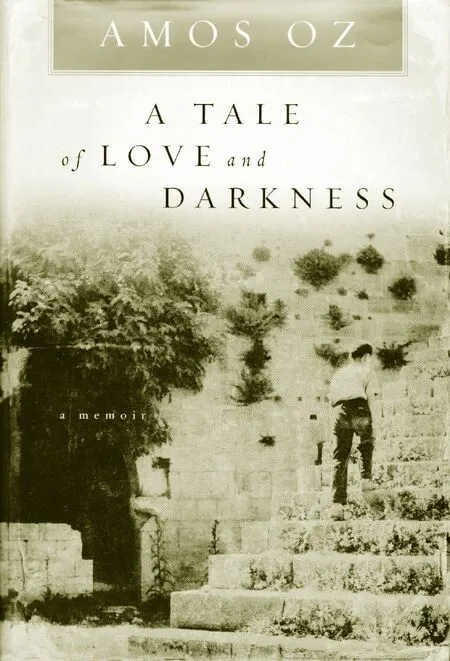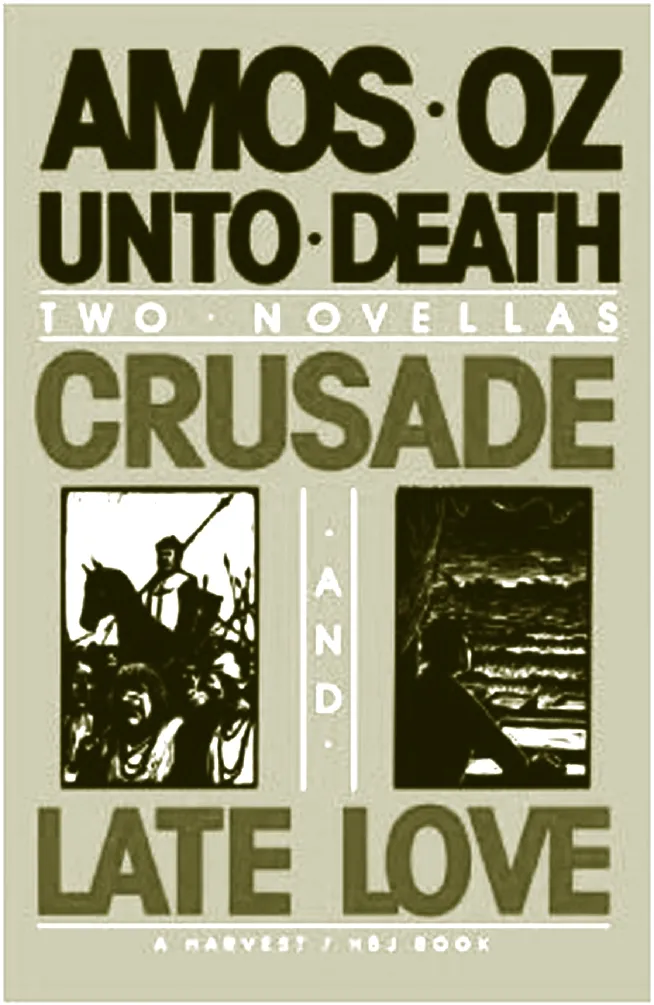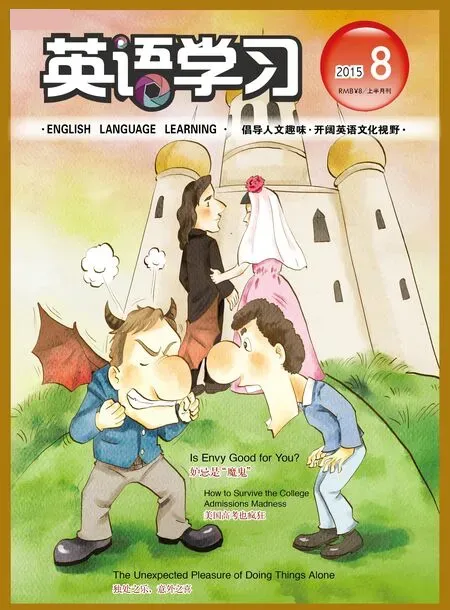To Forsake Is to Betray
Amos Oz
以色列作家奥兹的作品被翻译成三十余种语言并获多项重大文学奖,包括“费米娜奖”、“歌德文化奖”、“以色列奖”和2007年度的“阿斯图里亚斯亲王奖”。《爱与黑暗的故事》出版后短短五年,便被翻译成二十多种文字,并夺得2005年“歌德文化奖”,2007年入围“国际布克奖”。
奥兹的父母受过良好的教育,懂多国语言。然而这两个好人生活在一起却酿造了人生的悲剧。他母亲在他12岁时便抛夫弃子结束了自己年仅38岁的生命。作者无法原谅自己的母亲,甚至痛恨她,认为母亲这么做对他和他父亲都是一种耻辱。后来这种痛恨又转变为自责和悔恨,觉得自己一定是可恶之极,不值得母亲的爱,母亲才会没有任何交代地抛弃他而投奔死神。从奥兹充满诗意与张力的文字中,我们可以感受到奥兹被母亲抛弃和背叛后心理经受的折磨,他的余生都活在缅怀与伤痛里。

My father, before he died (in 1970), was able to read my first three books, which he did not entirely enjoy. My mother was able to see only some stories I wrote at school and a few childish verses(诗)that I penned(写)in the hope of touching the Muses1. Muses: 缪斯,九位文艺和科学女神的通称。(感动缪斯), whose existence she liked to tell me about. (My father did not believe in Muses, just as he always despised(看不起)fairies,witches, wonder-working rabbis(拉比,有学识的人),elves(精灵), any kind of saint, intuition(直觉力),miracles, and ghosts. He saw himself as a man with a secular(世俗的)worldview; he believed in rational thought and hard intellectual work.)

小说《爱与黑暗的故事》

小说《致死》
If my mother had read the two stories inUnto Death2. Unto Death: 《致死》,奥兹的早期作品,1971年出版。, would she, too, have responded to them with words similar to those written by her friend Lilenka Kalisch, “Longing and yearning for something that is not a place in the world”? It is hard to know. A misty veil of dreamy sadness, unexpressed emotions, and romantic suffering enfolded those well-to-do Rovno(罗夫诺,乌克兰一城市)young ladies, as though their lives there were pained forever within the walls of their secondary school with a palette(调色板)that contained only two colors:either melancholy(忧郁的)or festive(喜庆的). Although my mother sometimes rebelled against this upbringing.
Something in the curriculum of that school in the 1920s, or maybe some deep romantic mustiness(陈腐)that seeped into(渗入)the hearts of my mother and her friends in their youth, some dense(浓厚的)Polish-Russian emotionalism, something between Chopin(肖邦,波兰作曲家及钢琴家)and Mickiewicz3. Mickiewicz: 亚当·密茨凯维奇(1798—1855),波兰19世纪最伟大的诗人,1822年出版诗集《歌谣与传奇》。, between theSorrows of Young Werther(歌德的《少年维特的烦恼》)and Lord Byron4. Lord Byron: 拜伦勋爵(1788—1824),英国诗人、革命家,独领风骚的浪漫主义文学泰斗。, something in the twilight zone between the sublime(崇高的东西), the tormented(经受折磨和考验的), the dreamy, and the solitary(孤独的), all kinds of her life had seduced her until she succumbed(屈服)and committed suicide in 1952. She was 38 when she died. I was 12 and a half.
In the weeks and months that followed my mother’s death I did not think for a moment of her agony(极度痛苦). I made myself deaf to the unheard cry for help that remained behind her and that may have always hung in the air of our apartment. There was not a drop of compassion(同情)in me. Nor did I miss her. I did not grieve at(对……感到悲伤)my mother’s death: I was too hurt and angry for any other emotion to remain.When, for example, I noticed her checked apron(格子花纹的围裙), which still hung on a hook on the back of the kitchen door several weeks after her death, I was as angry as though it were pouring salt on my wounds.My mother’s toilet things(盥洗梳妆物), her powder box(化妆盒), her hairbrush on her green shelf in the bathroom hurt me as though they had remained there deliberately(故意地)to mock(嘲弄)me. Her books. Her empty shoes. The echo of her smell that continued for some time to waft(吹拂)in my face every time I opened“Mother’s side” of the closet(壁橱). Everything had somehow crept into(偷偷爬进)my pile of sweaters, was gloating(心满意足,沾沾自喜)at me with a vile(邪恶的)grin(咧嘴笑).
I was angry with her for leaving without saying good-bye, without a hug, without a word of explanation:after all, my mother had been incapable of parting even from a total stranger, a delivery man(送货员)or peddler(小贩)at the door, without offering him a glass of water, without a smile, without a little apology and two or three pleasant words. All through my childhood,she had never left me alone at the grocer’s or in a strange courtyard or in a public garden. How could she have done it? I was angry with her on Father’s behalf too,whose wife had shamed him thus, had shown him up,had suddenly vanished(消失)like a woman running away with a stranger in a comic film. Throughout my childhood, if I ever disappeared even for an hour or two,I was shouted at and punished: it was a fixed rule that anyone who went out always had to say where they were going and for how long and what time they would be back. At least they had to leave a note in the usual place,under the vase.
All of us.
Is that the way to leave, rudely, in the middle of a sentence? She herself had always insisted on tact(得体),politeness, considerate behavior, a constant effort not to hurt others, attentiveness(周到), sensitivity(敏感)! How could she?
I hated her.
After a few weeks the anger subsided(平息).And with the anger I seemed to lose a protector layer,a kind of lead casing(铅制的套子)that had protected me in the early days against the shock and pain. From now on I was exposed.
As I stopped hating my mother, I began to hate myself.
I still had no free corner in my heart for my mother’s pain, her loneliness, the suffocation(窒息)that had closed in around her, the terrible despair of the last nights of her life. I was still living out(活过,经历)my own crisis rather than hers. Yet I was no longer angry with her, but rather the opposite,I blamed myself: if only I had been a better, more devoted, son, if I had not scattered my clothes all over the floor, if I had not pestered(纠缠)and nagged(唠叨,抱怨)her, if I had done my homework on time, if I had taken the rubbish out every evening willingly,without being shouted at to do it, if I had not made a nuisance(讨厌鬼)of myself, made a noise, forgotten to turn out the light, come home with a torn shirt, left muddy footprints all around the kitchen. If I had been more considerate of her migraines(偏头痛). Or if at least I had tried to do what she wanted, and been a bit less weak and pale, eaten everything she cooked for me and put on my plate and not been so dif ficult, if for her sake I had been a more sociable child and a bit less of a loner, a bit less skinny and more suntanned and athletic(体格健壮的), as she had wanted me to be!
Or perhaps the opposite? If I had been much weaker, chronically(长期地)ill, con fined to(被限制在……里)a wheelchair, consumptive(有肺病的), or even blind from birth? Surely her kindliness her generous nature would never have allowed her to abandon such a disadvantaged(弱势的)child, leave him to his misery and just disappear? If only I had been a handicapped(残障的)child with no legs, if only while there was still time I had run under a passing car and been run over and had both my legs amputated(截肢的), perhaps my mother would have been filled with compassion? Would not have left me? Would have stayed to go on looking after me?
If my mother had abandoned me like that, without a backward glance, surely it was a sign that she had never loved me: if you love someone, she herself had taught me, you forgive them for everything, except betrayal. You even forgive them for nagging, for losing their cap, for leaving the squash(南瓜属蔬菜)on their plate.
To forsake(抛弃)is to betray. And she had forsaken both of us, Father and me. I would never have left her like that, despite her migraines, even though I now knew that she had never loved us, I would never have left her, despite her long silences, her shutting herself up in a darkened room, and all her moods. I’d have lost my temper sometimes, maybe even not talked to her for a day or two, but not abandoned her forever. Never.
All mothers love their children: that’s a law of nature. Even a cat or a goat. Even mothers of criminals and murderers. Even mothers of Nazis(纳粹). Or of drooling retards(流着口水的智障者). Even mothers of monsters. The fact that only I couldn’t be loved,that my mother had run away from me, only proved there was nothing in me to love, that I didn’t deserve love. There was something wrong with me, something very terrible, something repulsive(令人厌恶的)and truly horrifying, more loathsome(可憎的)than a physical or mental defect(心智缺陷,精神缺陷), or even madness. There was something so irreparably(不可挽回地)detestable(令人厌恶的)about me, something so terrible, that even a sensitive woman like my mother, who could lavish(慷慨给予)love on a bird or a beggar or a stray(迷路的)puppy,couldn’t stand me anymore and had to run away from me as far as she could go. There is an Arabic saying,Kullu quirdin bi-‘ayni ummihi ghazalun—“Every monkey is a gazelle(羚羊)to its mother.” Except for me.

If only I were also sweet, just a little, as all children in the world are to their mothers, even the ugliest and naughtiest children, even those violent,disturbed(心理不正常的)children who are always being thrown out of school, even Bianca Schor who stabbed her grandfather with a kitchen knife, even Yanni the pervert(性变态者), who has elephantiasis5. elephantiasis: 淋巴丝虫病,俗称象皮病,是一种被忽视的热带疾病。and unzips his fly(拉开裤门襟)in the street and takes out his thing6. 这里指生殖器。and shows it to the girls—if only I were good, if only I had behaved the way she asked me to a thousand times, and like an idiot I didn’t listen to her—if only after Seder7. Seder: 逾越节家宴,逾越节是犹太教的三大节期之一。night I had broken her blue bowl that had come down to her from her great grandfather—if only I’d brushed my teeth properly every morning, top and bottom and all around and in the corners, without cheating—if only I hadn’t pinched(用手指夹出来)that half-pound note from her handbag and then lied and denied I’d taken it—if only I’d stopped thinking those wicked thoughts and never left my hand stray inside my pajama bottoms at night—if only I’d been like everyone else, deserving a mother, too—
After a year or two, when I’d left home and gone to live in Kibbutz8. Kibbutz: 基布兹,以色列的集体农场。Hulda, I slowly started to think about her, too. At the end of the day, after school and work and a shower, when all the kibbutz kids had showered and dressed for the evening and gone to spend time with their parents, leaving me all alone and odd among the empty children’s houses, I would go and sit on my own on the wooden bench inside the reading room.
I would sit there in the dark for half an hour or an hour, conjuring up(想起,脑海中显现), picture by picture, the end of her life. In those days I was already trying to imagine a little of what had never been spoken about, either between my mother and me, or between me and my father, or apparently even between the two of them.
My mother was 38 when she died: younger than my elder daughter and a little older than my younger daughter on the day these lines were written. 10 or 20 years after they completed their studies at the Tarbuth secondary school, when my mother, Lilenka Kalisch, and their group of friends experienced the buffeting(冲击)of reality in a Jerusalem of heat waves, poverty, and malicious(恶意的)gossip, when those emotional Rovno schoolgirls suddenly found themselves in the rough terrain(领域)of everyday life,diapers(尿布), husbands, migraines, queues,smells of mothballs(樟脑丸)and kitchen sinks, it transpired(使蒸发)apparently that the curriculum of the school in Rovno in the 1920s was of no help to them. It only made things worse.

